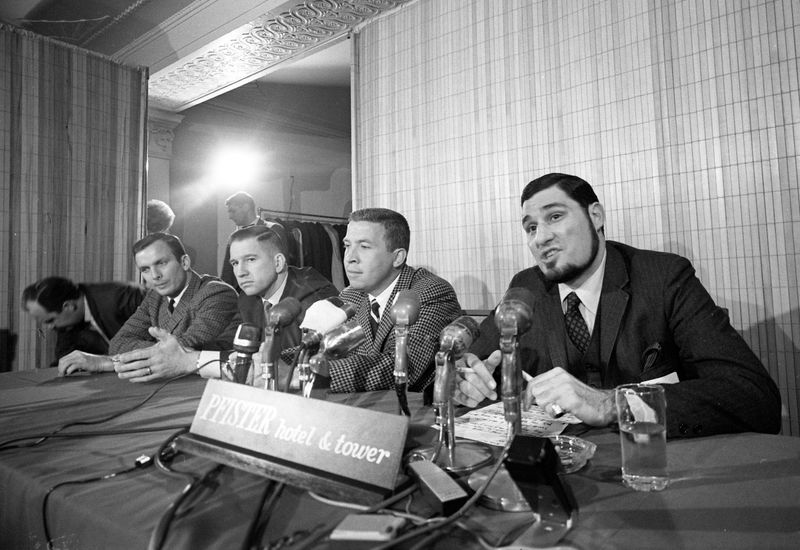The new Netflix documentary “Who Killed the Montreal Expos?” is a fascinating look at the now-relocated Major League Baseball franchise that called Montreal home from 1969 to 2004, particularly for enthusiastic fans of small-market baseball like those in Milwaukee.
The documentary points the finger in a number of directions, from basic economics to bad ownership to the 1994 players’ strike, as contributing factors to the franchise’s eventual departure for Washington, D.C. The documentary speaks to former players, fans and franchise leaders to get to the heart of why the beloved local club left town, leaving wounds that linger to this day.
Milwaukee doesn’t get mentioned in the documentary, which naturally focuses on the years leading up to the team’s relocation and not as much on its early history, but it has some interesting ties to the Expos — including … the co-founder of the Milwaukee Bucks?
In 1968, Bucks co-founder Wes Pavalon had interest in investing in the Expos
Wes Pavalon, a Chicago native who had launched a successful for-profit trade school, was chairman of the board of directors for the Bucks in 1968, with Milwaukee learning it was getting the expansion franchise in January.
Pavalon, who was on the phone call when the Bucks won the coin flip for the top pick in the 1969 NBA Draft — allowing them to make the easy choice of Lew Alcindor (later Kareem Abdul-Jabbar) — was a brash 34-year-old who teamed with Marvin Fishman and other investors to bring the NBA franchise to Milwaukee. The team was sold to Jim Fitzgerald and his investors in 1976.
Pavalon had acquired a small television repairman’s school in 1955 and quickly grew it into a multimillion-dollar business called Career Academy Inc. It included courses for medical and dental assistants, radio and television broadcasting, drafting, electronic technology and motel/hotel operations.
Career Academy also happened to have a Canadian branch based in Toronto. Seagram’s beverage heir Charles Bronfman, at the front of the movement to bring an MLB team to Montreal, had crossed paths with Pavalon, and the young businessman was interested in investing in the Expos. There was also chatter that Bronfman would invest in Career Academy.
The Expos had been awarded the franchise bid in May 1968, but by August, the agreement had started to look wobbly. At the heart of the issue was Montreal’s lack of concrete plan to develop a roofed stadium.
Milwaukee baseball fans were eagerly watching the Montreal situation
Montreal’s plight was of great interest to Milwaukee baseball fans. The city had been in the running to receive a National League expansion team in 1968, with play beginning in 1969, but San Diego and Montreal won those spots. In the American League, new franchises went to Seattle and Kansas City. Milwaukee was still reeling from losing the Braves after the 1965 season.
Though Buffalo, New York, was also a possibility if the Expos didn’t work out, Milwaukee fans saw Montreal’s uncertainty as a reopening of the window that Milwaukee could get the team, after all.
“This is Montreal’s team and I can’t see it ever being moved out of Canada,” Pavalon told Bob Wolf of the Milwaukee Journal, seemingly annoyed that Brewers fans had interpreted Pavalon’s interest as a play to woo baseball back to the city. “Bronfman is from an old Canadian family, and I’m sure if he tried to move the club, he would have the same problem I’d have if I tried to move the Bucks — which, incidentally, will never happen.”
“Anything that would hurt the image of the Milwaukee Bucks, I wouldn’t do,” Pavalon said. “Anything that helps build the image of Milwaukee as a mature city, not a catty town, will certainly help the Milwaukee Bucks.
“But I do have a life as an individual, and within the bounds of what is decent, I have a right to do anything I want. If the Philadelphia Eagles football team were available now and the price was reasonable and fair, I’d buy it.”
The Eagles reference wasn’t just a random team; the Eagles sold to Leonard Tose in 1969 for a pro-sports-record $16.15 million.
But Pavalon chided Milwaukee fans for rooting to see Montreal’s demise.
“What kind of decency is that?” he said. “It’s the same kind of dirty pool that Atlanta did to Milwaukee. Let’s say baseball expands again two years or so from now. How do you think Montreal will feel about Milwaukee?”
Pavalon did indicate he’d be willing to assist with a bid to bring baseball back to Milwaukee, a pursuit already being spearheaded by a group fronted by Bud Selig.
Milwaukee sort of got a 1968 expansion team, after all
Montreal never did build a domed stadium, at least not then. They began play at an open-air stadium called Jarry Park and stayed there until Olympic Stadium, a multipurpose venue built for the 1976 Summer Olympics, welcomed the Expos in 1977.
Rebuffed by MLB’s expansion, Selig led an effort to relocate the Chicago White Sox to Milwaukee, an arrangement that also fell through. But in 1970, Selig was able to bring the financially troubled Seattle Pilots to Milwaukee, and the Brewers were born in a whirlwind.
The Bucks, of course, won a championship shortly after establishment in 1971, then waited 50 years before winning another in 2021. The Bucks will launch their 58th season Oct. 22 at Fiserv Forum.
This article originally appeared on Milwaukee Journal Sentinel: How the Montreal Expos, the subject of a new Netflix documentary, are tied to the Milwaukee Bucks
Reporting by JR Radcliffe, Milwaukee Journal Sentinel / Milwaukee Journal Sentinel
USA TODAY Network via Reuters Connect


